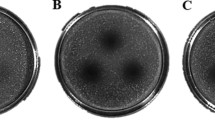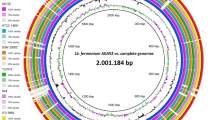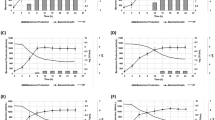Abstract
The human gut acts as a habitat for diverse microbial communities, including mucin utilizers that play a significant role in host health and diseases. In this study, a gram-positive, rod-shaped mucin degrading bacterium was isolated from human faeces that belonged to the Priestia flexa species. Priestia isolate was analyzed for mucin-degrading ability and found that the KS1 strain could grow on mucin as the sole carbon source. The experimental results of the mucolytic zone around the colony and a 58% decrease in carbohydrate concentration confirmed the ability of Priestia to degrade mucin. The intracellular and extracellular glycosidase assay data supported the above results suggesting the ability of P. flexa to produce glycan hydrolysis enzymes that convert complex mucin oligosaccharide chains into simple glycans. The survival ability of the KS1 strain in simulated gastrointestinal conditions revealed that it could tolerate low pH (≥ 50% cell viability at pH 1.0) and 0.5% bile salt concentration (≥ 85% cell viability). The strain showed low hydrophobicity towards n-hexadecane (26.51 ± 0.92%) and xylene (21.71 ± 0.54%). Moreover, the KS1 culture was resistant to cefixime, clavulanic acid/ceftazidime, nafallin, methicillin, trimethoprim, kanamycin, and nalidixic antibiotic. Our results highlight the isolation of P. flexa KS1 strain that degrade mucin under in vitro conditions and show its better acclimatization within the GI environment. Further studies are required to unearth the molecular mechanisms involved in the degradation of mucin oligosaccharides in the human gut, advancing our understanding of health and disease.



Similar content being viewed by others
Data availability
The generated and analyzed data during the current study are available from the corresponding author on reasonable request.
References
Aarts H, Margolles A (2014) Antibiotic resistance genes in food and gut (non pathogenic) bacteria. Bad genes in good bugs. Front Microbiol 5(Dec):2014–2015. https://doi.org/10.3389/fmicb.2014.00754
Aristoteli LP, Willcox MDP (2003) Mucin degradation mechanisms by distinct Pseudomonas aeruginosa isolates in vitro. Infect Immun 71(10):5565–5575. https://doi.org/10.1128/IAI.71.10.5565-5575.2003
Bansil R, Turner BS (2006) Mucin structure, aggregation, physiological functions and biomedical applications. Curr Opin Colloid Interface Sci 11(2–3):164–170. https://doi.org/10.1016/j.cocis.2005.11.001
Bell A, Juge N (2021) Mucosal glycan degradation of the host by the gut microbiota. Glycobiology 31(6):691–696. https://doi.org/10.1093/glycob/cwaa097
Bhowmick R, Ghosal A, Das B, Koley H, Saha DR, Ganguly S, Nandy RK, Bhadra RK, Chatterjee NS (2008) Intestinal adherence of Vibrio cholerae involves a coordinated interaction between colonization factor GbpA and Mucin. Infect Immun 76(11):4968–4977. https://doi.org/10.1128/IAI.01615-07
Chatterjee M, Pushkaran AC, Vasudevan AK, Menon KKN, Biswas R, Mohan CG (2018) Understanding the adhesion mechanism of a mucin binding domain from Lactobacillus fermentum and its role in enteropathogen exclusion. Int J Biol Macromol 110:598–607. https://doi.org/10.1016/j.ijbiomac.2017.10.107
Colina AR, Aumont F, Deslauriers N, Belhumeur P, De Repentigny L (1996) Evidence for degradation of gastrointestinal mucin by Candida albicans secretory aspartyl proteinase. Infect Immun 64(11):4514–4519. https://doi.org/10.1128/iai.64.11.4514-4519.1996
Corfield AP, Wagner SA, Clamp JR, Kriaris MS, Hoskins LC (1992) Mucin degradation in the human colon: production of sialidase, sialate O- acetylesterase, N-acetylneuraminate lyase, arylesterase, and glycosulfatase activities by strains of fecal bacteria. Infect Immun 60(10):3971–3978. https://doi.org/10.1128/iai.60.10.3971-3978.1992
Cozzolino A, Vergalito F, Tremonte P, Iorizzo M, Lombardi S, Sorrentino E, Luongo D, Coppola R, Di Marco R, Succi M (2020) Preliminary evaluation of the safety and probiotic potential of Akkermansia muciniphila DSM22959 in comparison with Lactobacillus rhamnosus GG. Microorganisms 8(2):189. https://doi.org/10.3390/microorganisms8020189
Crost EH, Tailford LE, Le Gall G, Fons M, Henrissat B, Juge N (2013) Utilisation of mucin glycans by the human gut symbiont Ruminococcus gnavus is strain-dependent. PLoS ONE 8(10):e76341. https://doi.org/10.1371/journal.pone.0076341
De Rezende ST, Guimarães VM, De Rodrigues MC, Felix CR (2005) Purification and characterization of an α-galactosidase from Aspergillus fumigatus. Braz Arch Biol Technol 48(2):195–202. https://doi.org/10.1590/s1516-89132005000200005
del Moral S, Barradas-Dermitz DM, Aguilar-Uscanga MG (2018) Production and biochemical characterization of α - glucosidase from Aspergillus niger ITV - 01 isolated from sugar cane bagasse. 3 Biotech 8(1):1–9. https://doi.org/10.1007/s13205-017-1029-6
Deplancke B, Gaskins HR (2001) Microbial modulation of innate defense: goblet cells and the intestinal mucus layer. Am J Clin Nutr 73(6):1131–1141. https://doi.org/10.1093/ajcn/73.6.1131s
Derrien M (2007) Mucin utilisation and host interactions of the novel intestinal microbe Akkermansia muciniphila. Narcisinfo, p 174
Engevik AC, Engevik KA, Auchtung JM, Chang-Graham AL, Ruan W, Luna RA, Hyser JM, Spinler JK, Versalovic J (2021) Mucin-degrading microbes release monosaccharides that chemoattract Clostridioides difficile and facilitate colonization of the human intestinal mucus layer. ACS Infectious Diseases 7(5):1126–1142. https://doi.org/10.1021/acsinfecdis.0c00634
Ensgraber M, Loos M (1992) A 66-kilodalton heat shock protein of Salmonella typhimurium is responsible for binding of the bacterium to intestinal mucus. Infect Immun 60(8):3072–3078. https://doi.org/10.1128/iai.60.8.3072-3078.1992
Forslund K, Sunagawa S, Kultima JR, Mende DR, Arumugam M, Typas A, Bork P (2013) Country-specific antibiotic use practices impact the human gut resistome. Genome Res 23(7):1163–1169. https://doi.org/10.1101/gr.155465.113
Glover JS, Ticer TD, Engevik MA (2022) Characterizing the mucin-degrading capacity of the human gut microbiota. Sci Rep 12(1):1–14. https://doi.org/10.1038/s41598-022-11819-z
Govindarajan B, Menon BB, Spurr-Michaud S, Rastogi K, Gilmore MS, Argüeso P, Gipson IK (2012) A metalloproteinase secreted by Streptococcus pneumoniae removes membrane mucin MUC16 from the epithelial glycocalyx barrier. PLoS ONE 7(3):e32418. https://doi.org/10.1371/journal.pone.0032418
Gupta M, Didwal G, Bansal S, Kaushal K, Batra N, Gautam V, Ray P (2019) Antibiotic-resistant enterobacteriaceae in healthy gut flora: a report from north Indian semiurban community. Indian J Med Res 149(2):276. https://doi.org/10.4103/ijmr.IJMR_207_18
Gupta RS, Patel S, Saini N, Chen S (2020) Robust demarcation of 17 distinct bacillus species clades, proposed as novel bacillaceae genera, by phylogenomics and comparative genomic analyses: Description of robertmurraya kyonggiensis sp. nov. and proposal for an emended genus bacillus limiting it only to the members of the subtilis and cereus clades of species. Int J Syst Evol Microbiol 70(11):5753–5798. https://doi.org/10.1099/ijsem.0.004475
Hedge JE, Hofreiter B (1962) Determination of Reducing Sugars. Acad Press 127(3198):380–394. https://doi.org/10.1021/ac50080a008
Hoskins LC, Boulding ET (1981) Mucin degradation in human colon ecosystems. J Clin Investig 67(1):163–172. https://doi.org/10.1172/jci110009
Hoskins LC, Agustines M, McKee WB, Boulding ET, Kriaris M, Niedermeyer G (1985) Mucin degradation in human colon ecosystems. Isolation and properties of fecal strains that degrade ABH- blood group antigens and oligosaccharides from mucin glycoproteins. J Clin Investig 75(3):944–953. https://doi.org/10.1172/JCI111795
Jebeli MA, Maleki A, Amoozegar MA, Kalantar E, Izanloo H, Gharibi F (2017) Bacillus flexus strain As-12, a new arsenic transformer bacterium isolated from contaminated water resources. Chemosphere 169:636–641. https://doi.org/10.1016/j.chemosphere.2016.11.129
Jensen PH, Kolarich D, Packer NH (2010) Mucin-type O-glycosylation- putting the pieces together. FEBS J 277(1):81–94. https://doi.org/10.1111/j.1742-4658.2009.07429.x
Kara F (2004) Release and characterization of beta-galactosidase from Lactobacillus plantarum. Thesis submitted to Middle-East technical university
Kaur R, Singh D, Kesavan AK, Kaur R (2020) Molecular characterization and antimicrobial susceptibility of bacterial isolates present in tap water of public toilets. Int Health 12(5):472–483. https://doi.org/10.1093/inthealth/ihz074
Korshunov VM, Gudieva ZA, Efimov BA, Pikina AP, Smeianov VV, Reid G, Korshunova O, Tiutiunnik V, Stepin II (1999) The vaginal bifidobacterium flora in women of reproductive age. Zh Mikrobiol Epidemiol Immunobiol 4:74–78
Lowry OH, Rosebrough NJ, Farr AL, Randall RJ (1951) Protein measurement with the folin phenol reagent. J Biol Chem 193(1): 265–75. http://www.ncbi.nlm.nih.gov/pubmed/14907713
Mahapatra S, Vickram AS, Sridharan TB, Parameswari R, Pathy MR (2016) Screening, production, optimization and characterization of b -glucosidase using microbes from shellfish waste. 3 Biotech 6(2):1–10. https://doi.org/10.1007/s13205-016-0530-7
Matos R, Amorim I, Magalhães A, Haesebrouck F, Gärtner F, Reis CA (2021) Adhesion of helicobacter species to the human gastric mucosa: a deep look into glycans role. Front Mol Biosci (8). https://doi.org/10.3389/fmolb.2021.656439
Metcalfe J, Krogfelt K, Krivan H, Cohen P, Laux D (1991) Characterization and identification of a porcine small intestine mucus receptor for the K88ab fimbrial adhesin. Infect Immun 59(1):91–96. https://doi.org/10.1128/iai.59.1.91-96.1991
Miller RS, Hoskins LC (1981) Mucin degradation in human colon ecosystems. Fecal population densities of mucin-degrading bacteria estimated by a “most probable number” method. Gastroenterology 81(4): 759–65. http://www.ncbi.nlm.nih.gov/pubmed/7262520
Mishra V, Prasad D (2005) Application of in vitro methods for selection of strains as potential probiotics. Int J Food Microbiol 103(1):109–115. https://doi.org/10.1016/j.ijfoodmicro.2004.10.047
Nithya V, Halami PM (2013) Evaluation of the probiotic characteristics of Bacillus species isolated from different food sources. Annal Microbiol 63(1):129–137. https://doi.org/10.1007/s13213-012-0453-4
Osmanagaoglu O, Kiran F, Ataoglu H (2010) Evaluation of in vitro probiotic potential of Pediococcus pentosaceus OZF isolated from human breast milk. Probiotics Antimicrob Protein 2(3):162–174. https://doi.org/10.1007/s12602-010-9050-7
Owen CD, Tailford LE, Monaco S, Šuligoj T, Vaux L, Lallement R, Khedri Z, Yu H, Lecointe K, Walshaw J, Tribolo S, Horrex M, Bell A, Chen X, Taylor G, Varki A, Angulo J, Juge N (2017) Unravelling the specificity and mechanism of sialic acid recognition by the gut symbiont Ruminococcus gnavus. Nat Commun 8(1). https://doi.org/10.1038/s41467-017-02109-8
Pelaseyed T, Bergström JH, Gustafsson JK, Ermund A, Birchenough GMH, Schütte A, van der Post S, Svensson F, Rodríguez- Piñeiro AM, Nyström EEL, Wising C, Johansson MEV, Hansson GC (2014) The mucus and mucins of the goblet cells and enterocytes provide the first defense line of the gastrointestinal tract and interact with the immune system. Immunol Rev 260(1):8–20. https://doi.org/10.1111/imr.12182
Puapermpoonsiri S, Kato N, Watanabe K, Ueno K, Chongsomchai C, Lumbiganon P (1996) Vaginal microflora associated with bacterial vaginosis in Japanese and Thai pregnant women. Clin Infect Dis 23(4):748–752. https://doi.org/10.1093/clinids/23.4.748
Rafay AM, Homer KA, Beighton D (1996) Effect of mucin and glucose on proteolytic and glycosidic activities of Streptococcus oralis. J Med Microbiol 44(6):409–417. https://doi.org/10.1099/00222615-44-6-409
Ramphal R, Carnoy C, Fievre S, Michalski JC, Houdret N, Lamblin G, Strecker G, Roussel P (1991) Pseudomonas aeruginosa recognizes carbohydrate chains containing 1 (Galβ1-3GlcNAc) or type 2 (Galβ1-4GlcNAc) disaccharide units. Infect Immun 59(2):700–704. https://doi.org/10.1128/iai.59.2.700-704.1991
Ravcheev DA, Thiele I (2017) Comparative genomic analysis of the human gut microbiome reveals a broad distribution of metabolic pathways for the degradation of host-synthetized mucin glycans and utilization of mucin-derived monosaccharides. Front Genet 8(Aug):1–22. https://doi.org/10.3389/fgene.2017.00111
Reunanen J, Kainulainen V, Huuskonen L, Ottman N, Belzer C, Huhtinen H, de Vos WM, Satokari R (2015) Akkermansia muciniphila adheres to enterocytes and strengthens the integrity of the epithelial cell layer. Appl Environ Microbiol 81(11):3655–3662. https://doi.org/10.1128/AEM.04050-14
Roberton AM, Stanley RA (1982) In vitro utilization of mucin by Bacteroides fragilis. Appl Environ Microbiol 43(2):325–330. https://doi.org/10.1128/aem.43.2.325-330.1982
Sack RB, Albert MJ, Alam K, Neogi PKB, Akbar MS (1994) Isolation of enterotoxigenic Bacteroides fragilis from Bangladeshi children with diarrhea: a controlled study. J Clin Microbiol 32(4):960–963. https://doi.org/10.1128/jcm.32.4.960-963.1994
Sajjan SU, Forstner JF (1990) Characteristics of binding of Escherichia coli serotype O157:H7 strain CL-49 to purified intestinal mucin. Infect Immun 58(4):860–867. https://doi.org/10.1128/iai.58.4.860-867.1990
Sanchez-Gonzalez M, Blanco-Gamez A, Escalante A, Valladares AG, Olvera C, Parra R (2011) Isolation and characterization of new facultative alkaliphilic Bacillus flexus strains from maize processing waste water (nejayote). Lett Appl Microbiol 52(4):413–419. https://doi.org/10.1111/j.1472-765X.2011.03021.x
Selwal KK, Selwal MK, Yu Z (2021) Mucolytic bacteria: prevalence in various pathological diseases. World J Microbiol Biotechnol 37(10):1–16. https://doi.org/10.1007/s11274-021-03145-9
Shobharani P, Halami PM (2014) Cellular fatty acid profile and H+-ATPase activity to assess acid tolerance of Bacillus sp. for potential probiotic functional attributes. Appl Microbiol Biotechnol 98(21):9045–9058. https://doi.org/10.1007/s00253-014-5981-3
Sicard JF, Le Bihan G, Vogeleer P, Jacques M, Harel J (2017) Interactions of intestinal bacteria with components of the intestinal mucus. Frontiers in Cellular and Infection Microbiology 7(Sep). https://doi.org/10.3389/fcimb.2017.00387
Tailford LE, Crost EH, Kavanaugh D, Juge N (2015) Mucin glycan foraging in the human gut microbiome. Front Genet 5(Feb). https://doi.org/10.3389/fgene.2015.00081
Thirabunyanon M, Thongwittaya N (2012) Protection activity of a novel probiotic strain of Bacillus subtilis against Salmonella Enteritidis infection. Res Vet Sci 93(1):74–81. https://doi.org/10.1016/j.rvsc.2011.08.008
van Muijlwijk GH, van Mierlo G, Jansen PWTC, Vermeulen M, Bleumink-Pluym NMC, Palm NW, van Putten J, de Zoete MR (2021) Identification of Allobaculum mucolyticum as a novel human intestinal mucin degrader. Gut Microbes 13(1). https://doi.org/10.1080/19490976.2021.1966278
Wagner CE, Wheeler KM, Ribbeck K (2018) Mucins and their role in shaping the functions of mucus barriers. Annu Rev Cell Dev Biol 34(1):189–215. https://doi.org/10.1146/annurev-cellbio-100617-062818
Warren L (1959) The thiobarbituric acid assay of sialic acids. J Biol Chem 234(8):1971–1975. https://doi.org/10.1016/S0021-9258(18)69851-5
Wright DP, Rosendale DI, Roberton AM (2000) Prevotella enzymes involved in mucin oligosaccharide degradation and evidence for a small operon of genes expressed during growth on mucin. FEMS Microbiol Lett 190(1):73–79. https://doi.org/10.1111/j.1574-6968.2000.tb09265.x
Acknowledgements
We would like to thank Deenbandhu Chhotu Ram University of Science and Technology, Murthal for providing research environment to us.
Funding
The first and corresponding author gratefully acknowledges the financial support provided by Science and Engineering Board, Department of Science & Technology (DST), New Delhi, to conduct the research under the EEQ scheme (Grant No.: 2017/00354).
Author information
Authors and Affiliations
Contributions
Garima Deswal: methodology, investigation, and formal analysis of manuscript. Manjit K. Selwal: data curation and help in experimental design. Harsha Nirvan: acquisition of experimental setup. Krishan Kumar Selwal: conception, editing and critical review of manuscript, funding acquisition, and project administration.
Corresponding author
Ethics declarations
Ethics approval
Written informed consents were obtained from all individual participants included in the study.
Competing interests
The authors declare no competing interests.
Additional information
Publisher's note
Springer Nature remains neutral with regard to jurisdictional claims in published maps and institutional affiliations.
Rights and permissions
Springer Nature or its licensor (e.g. a society or other partner) holds exclusive rights to this article under a publishing agreement with the author(s) or other rightsholder(s); author self-archiving of the accepted manuscript version of this article is solely governed by the terms of such publishing agreement and applicable law.
About this article
Cite this article
Deswal, G., Selwal, M.K., Nirvan, H. et al. Priestia flexa KS1: A new bacterial strain isolated from human faeces implicated in mucin degradation. Int Microbiol 26, 475–486 (2023). https://doi.org/10.1007/s10123-022-00312-2
Received:
Revised:
Accepted:
Published:
Issue Date:
DOI: https://doi.org/10.1007/s10123-022-00312-2




